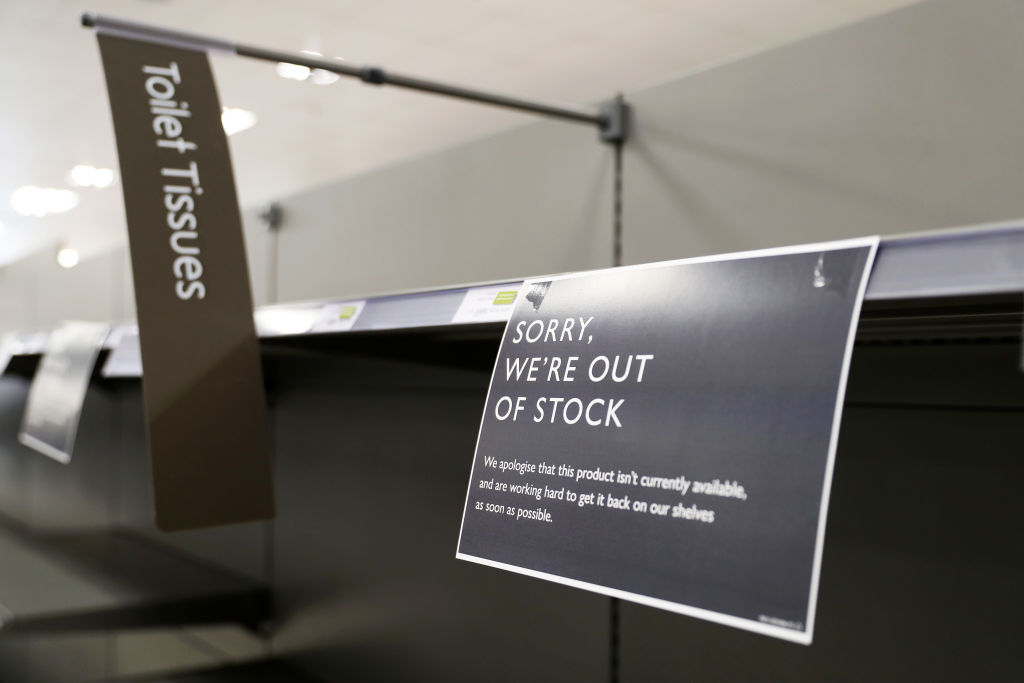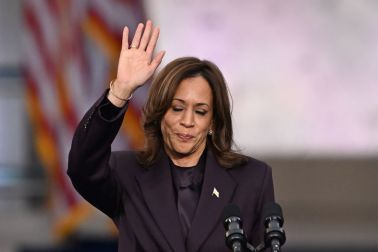If Brexit did not do it, the panic buying has trampled to death national myths patriots once cherished. We now see that ‘quintessentially English’ does not now mean a reserved character with a stiff upper lip joining an orderly queue. But a demonically possessed shopper lunging towards the last four-pack of loo roll.
Conservatives can find one comfort, however: the crisis is upholding their view of human nature – or at least it appears to be. Covid-19 is giving life to Margaret Thatcher’s sociological analysis. ‘There’s no such thing as society. There are individual men and women and there are families. And no government can do anything except through people, and people must look after themselves first. It is our duty to look after ourselves and then, also, to look after our neighbours.’
That’s about right, isn’t it? I know that many good people are doing all they can to look after their neighbours and strangers. But the Darwinian instinct to ‘look after ourselves’ and our families is taking over. The needless mobbing of supermarkets as millions decide that social distancing can go to hell, has put shoppers’ lives at risk, and (although no one appears to think about them) shop workers’ lives at risk too. Much finger wagging has followed from moralists. As a suspicious journalist, I doubt their sincerity and want to check their kitchen cupboards for hoarded food before believing that their genes are less selfish than anyone else’s.
Of course, when fear takes hold the war of one against all begins. If this mess of a government briefs it may lockdown London and then does not lockdown London then, naturally, panic ensues. Yet here is something no one expected to see. Now that millions are proving their commitments to society are faint at best, Conservatives are turning into socialists. The government announces vast state interventions by the hour. Left-wing campaigners find themselves in a new world. They assumed five years of a Conservative administration with a strong majority guaranteed that pretty much everything they said would be ignored. Now what they suggest one day the government adopts the next. It is as if they are in Downing Street.
Torsten Bell of the Resolution Foundation told me that last week no one in No 10 was interested in ideas of the state directly subsidising employees’ wages. Conservative governments don’t do that kind of thing.
Yesterday the arguments of his foundation’s ‘Doing What It Takes’ paper were being repeated everywhere. We’re heading for a return to mass unemployment that will further depress the collapsing economy, the foundation and many others argued. Lower earners are likely to be hit most swiftly, in contrast to the 2008 financial crisis. Hotels, restaurants, cafes, and the wider hospitality industry are going under, and their staff have typical weekly pay of £320, compared to £455 for the economy as a whole. More broadly, fewer than one-in-ten of those in the bottom half of earners say they can work from home. They cannot protect their incomes or indeed their families and self-quarantine. Thatcher’s remark that there are only ‘individual men and women and there are families’ cuts both ways. It turns out in a slump, the only way to protect the individual and the family is to accept that there is such a thing as society. And if society is falling down it needs to be strengthened.
Extraordinary action is called for. Not just making sure that all low paid workers receive sick pay – and you can see how a crisis exposes the faults of a country when you discover that it does not – but direct state subsidies for wages to prevent mass layoffs. The Resolution Foundation suggested firms continuing to pay idle workers at least two-thirds of their previous wages via their payroll, with the state providing a rebate at a cost of £4 billion for an initial six months if 500,000 employees were involved, and £8 billion if a million were. European countries have variants on this theme. My advice, for what it is worth, is to go for the fastest and simplest system on offer
The Chancellor of the Exchequer will come up his proposals today. Maybe he will duck wage subsidies for workers and stick to providing tax holidays for business. It may not matter if he does. The pattern of the crisis is that the conservative line does not hold, and eventually the government has to concede; not out of fear of opposition attacks, but because the logic of events drives towards state intervention.
Go back to the supermarkets. How long can government tolerate this anarchy? Politicians and journalists talk about the need to close pubs and restaurants . They should be more concerned with the food supply. You are most likely to catch the virus in a crowded supermarket, and unless order is restored, we may not be able to ensure the vulnerable and the housebound get supplies.
The crisis of the 2020s is the reverse image of the crisis of the 1970s, a time of power cuts and shortages, which rings a distant bell. If inflation, industrial militancy and the terrible example of the Soviet Union pushed public opinion to the right, so today the pandemic and the terrible example of Trump’s America is pushing it leftwards. You may wish we did not have a prime minister unsuited by temperament and ideology for the times we live in. But we are where we are. He’s the only prime minister we have, and the pressure of events is forcing him to become a prime minister he never wanted to be.
My favourite quote from the early seventies comes from AJP Taylor. The radical historian contemplated the rise of syndicalist trade unionism and mass strikes, and sighed at the wreckage around him: ‘I have been expecting the collapse of British capitalism all my life. Now that it comes I am rather annoyed.’
Ministers who thrilled to Ayn Rand as teenagers and contributed libertarian essays to Britannia Unchained, are learning a hard truth, doubtless to their own annoyance. Capitalism is all very well for easy times when human suffering is confined to its usual levels. But national emergencies demand state control.







Comments